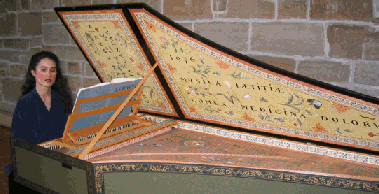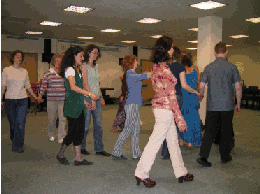
Posts
-
About Micaela Schmitz and Early Music in the Vale
Early Music in the Vale began in 2001 with some early music ‘jam sessions’ which were organised by Dr. Micaela Schmitz to bring together early music enthusiasts in the Vale of Evesham. Those in the Vale know that we have to do a lot of travelling to get to gatherings of early musicians, so there’s…
-
Micaela Schmitz
Dr. Micaela Schmitz (originally from the U.S.) specialises in early keyboard instruments, including harpsichord, fortepiano and clavichord. She earned her Doctorate of Musical Arts (on 18th century keyboard music) under Arthur Haas at the Eastman School of Music, in Rochester, New York. This was preceded by a first degree in Music at U.C. Berkeley, and…
-
Micaela in Costume
The many faces of Micaela – through the ages Medieval, made by Jan Pepper, Fabric from Dunelm Mill. Tudor dress (Butterick) made by Abi Seabrook (Farthingale by Jim and Micaela Schmitz, French hood by Micaela, using patterns from the Tudor Tailor.) Fabric from Barry’s Fabrics. with Elizabethan Headdress and with standing collar(ideas from Tudor Tailor,…
-
Upcoming concert with Cincinnati Early Music Festival
I’ll be one of the harpsichordists performing in the concert on Sunday. Feb. 18 at 3pm. All the details are here. Tickets are available here.It’s great to be back in the U.S. where Sunday afternoon concerts are a regular thing –so easy to get to for young and old alike. This program is full of…

